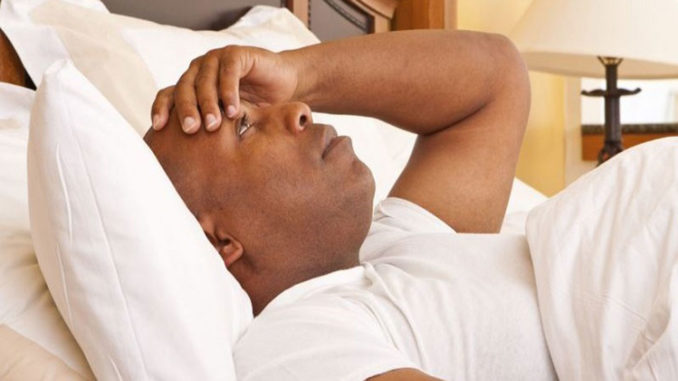
A new research, published in the Journal of Neuroscience, finds that sleep deprivation increases sensitivity to pain by numbing the brain’s painkilling response.
The effects of sleep deprivation on the brain are numerous, from inducing an inebriation-like state of cognitive impairment to hindering our ability to learn and form new memories.
New research highlights another neurological effect of insufficient sleep: heightened sensitivity to pain.
A lack of sleep impairs the brain’s natural mechanisms for relieving pain, finds the new study, which draws attention to potential links between the public health crises of sleep deprivation, chronic pain, and prescription opioid addiction.
Matthew Walker, a professor of neuroscience and psychology at the University of California in Berkeley carried out the study, together with doctoral candidate Adam Krause.
Walker and Krause induced pain in 24 healthy, young study participants by applying heat to their legs. As they were doing so, the scientists scanned the participants’ brains, examining the circuits that process pain.
The participants did not have any problems sleeping or any pain-related disorders at the beginning of the study.
The scientists started by recording each participant’s pain threshold after a good night’s sleep by scanning their brain with a functional Magnetic Resonance Imaging (MRI) machine while applying increasing levels of heat to the participant’s skin.
Once the scientists had established the person’s pain threshold, they repeated the procedure after a night of no sleep.
“Across the group, [the participants] were feeling discomfort at lower temperatures, which shows that their own sensitivity to pain had increased after inadequate sleep,” reports Krause, the study’s lead author.
“The injury is the same,” he explains, “but the difference is how the brain assesses the pain without sufficient sleep.”
The researchers found that the brain’s somatosensory cortex, a region associated with pain sensitivity, was hyperactive when the participants hadn’t slept enough. This confirmed the hypothesis that sleep deprivation would interfere with pain-processing neural circuits.
However, a surprising finding was that the activity in the brain’s nucleus accumbens was lower than usual after a sleepless night. The nucleus accumbens releases the neurotransmitter dopamine, which increases pleasure and relieves pain.
“Sleep loss not only amplifies the pain-sensing regions in the brain but blocks the natural analgesia centers, too,” explains Prof. Walker.
Finally, the researchers found that the brain’s insula, which assesses pain signals and prepares the body’s reaction to pain, was also underactive.
“This is a critical neural system that assesses and categorizes the pain signals and allows the body’s own natural painkillers to come to the rescue,” notes Krause.
To replicate their findings, the researchers also conducted a survey of over 230 adults who were registered in Amazon’s Mechanical Turk online marketplace. The participants reported their sleep patterns and pain sensitivity levels over several days.
The scientists found that the smallest changes in the participants’ sleep patterns correlated with changes in pain sensitivity.
Also, sleep deprivation was associated with Deoxy Nucleic Acid (DNA)/genetic material damage in a new Anesthesia study.
In the observational study on 49 healthy full-time doctors who had their blood analyzed at different time points, on-call doctors who were required to work overnight on-site had lower DNA repair gene expression and more DNA breaks than participants who did not work overnight. In these overnight on-site call doctors, DNA repair gene expression decreased and DNA breaks increased after sleep deprivation. Damaged DNA increased after only one night of sleep deprivation.
Although additional research is needed, this DNA damage may help explain the increased risk for cancer and cardiovascular, metabolic, and neurodegenerative diseases associated with sleep deprivation.
“Although this work is very preliminary, it is clear from the results that even a single night of sleep deprivation can trigger events that may contribute to the development of chronic disease,” said senior author Dr. Siu-Wai Choi, of the University of Hong Kong.
“Anesthetists (and other health professionals) frequently work night shifts and on call duties, and their work patterns change frequently between night and day work. This study is important in that it will allow future researchers to study the impact of changing the way we work and other interventions by evaluating DNA breaks in the same way as the authors of this groundbreaking study have done,” said Dr Klein, the Editor-in-Chief of the journal.
“The results clearly show that even very subtle changes in nightly sleep — reductions that many of us think little of in terms of consequences — have a clear impact on your next-day pain burden,” Krause says.
END

Be the first to comment